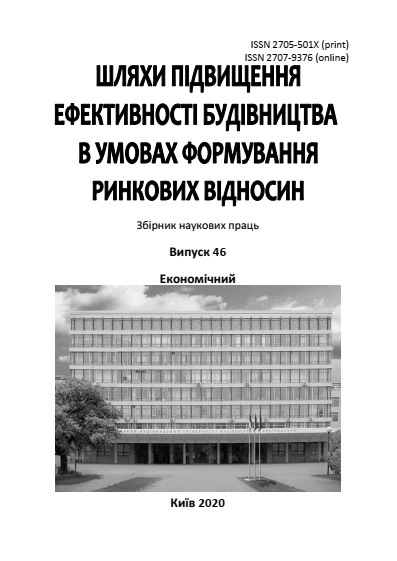Budgeting as a tool for planning and managing business activities of the enterprise
DOI:
https://doi.org/10.32347/2707-501x.2020.46.24-31Keywords:
budgeting, principles of budgeting, methods of budgeting, economic activityAbstract
The article highlights the theoretical approaches to the essence of the concept of "budgeting" as a tool for managing economic activity of the enterprise. Based on the study of interpretations of the "budgeting" concept, a comparison of opinions of different scientists-researchers of this economic category is generalized and formed. The role of budgeting and opportunities for effective management of economic activity of the enterprise are revealed. The principles on which the budgeting system is based are analyzed and supplemented by their own, which include: optimality; unity; systematics, transparency, alternatives, complexity. The classification of budgeting methods is carried out according to the following classification features: selection of budget planning objects, initial base, budget development procedure, level of centralization, level of adaptation of budget planning to changes in the external environment, method of planned budget indicators calculating. It is determined that budgeting as well as any economic category has its advantages and disadvantages, the main of which are given in this article.
Modern business conditions necessitate entrepreneurs to take into account changes in both internal and external environment, actively master innovative management technologies, study market conditions, take into account the probability of certain events and at the same time develop models of enterprise behavior in the absence of sustainable development in labor, material, information and financial resources.
A significant number of business representatives appreciated the benefits of applying the budgeting process in practice, which is one of the management tools and has become widespread in economically developed countries. Budgeting is not a universal method of avoiding negative impact on the results of their activities, but provides an opportunity to navigate in a real fast-changing environment and make the necessary sound management decisions that will provide optimal conditions for business development in an unstable economy. The practical application of budgeting becomes an objective necessity, as it helps to optimize resource flows, ensures economical use of all types of resources, affects cash flow management, increases financial discipline, the level of investment attractiveness and competitiveness of enterprises.
References
Волинчук Ю.В. Бюджетування як інструмент управління фінансово-економічними результатами підприємства. Економічний форум. Серія «Облік і фінанси». Випуск 11 (41). Ч. 3. Луцьк: Луцький НТУ, 2014. С. 17-27.
Дмитриев А.Е. Бюджетное управление: типичные ошибки. Экономика. Финансы. Управление. 2007. № 10. С. 91–99.
Загойко М.А. Бюджетування як інструмент управління господарською діяльністю підприємства. Форум фінансових дискусій «Стратегічні орієнтири». Режим доступу: [http://libfor.com/index.php?newsid=2687]
Керимов В.Э. Управленческий учет: учебн. пособ. Маркетинг, 2004. 268 с.
Орленко С.С. Система бюджетування як інструмент ефективного управління фінансовою діяльністю підприємств. Загальні питання економіки: зб. публікацій. 2011. № 10. С. 62-65.
Писаренко Т. Бюджетування як основа ефективного управління підприємством. Економіка і ринок: облік, аналіз, контроль. 2007. № 16. С. 304–311.
Поняття бюджетування: суть, мета, відмінні риси. Режим доступу: [https://studfile.net/preview/5390500/]
Сердюк Я.В. Бюджетування як складова фінансового планування на підприємстві. Інтернаука. 2016. № 12 (22), т. 2. С. 141-145.
Хліпацька В. Бюджетне планування запасів і витрат з їх придбання і зберігання. Бухгалтерський облік і аудит. 2004. №4. С. 18-22.
Хруцкий В.Е., Хруцкий Р.В. Системы бюджетирования. Семь шагов по эффективной постановке бюджетирования: Финансы и статистика, 2007. 176 с.
Гумега В.В. Особливості аудиту будівельних підприємств. Шляхи підвищення ефективності будівництва в умовах формування ринкових відносин. 2020. №44. С.24-30.
Бєлєнкова О.Ю., Цифра Т.Ю. Формування стратегії забудовників в умовах економічної динаміки Шляхи підвищення ефективності будівництва в умовах формування ринкових відносин. 2019. № 42. С. 189–198.
Крикун К.В., Оліферук С.Л., Рязанов А.С. Структуризація статей і елементів собівартості як елемент техніко-економічного аналізу з метою оптимізації витрат і підвищення конкурентоспроможності підприємства. Управління розвитком складних систем. 2019. № 38. С. 139 –142.
Downloads
Published
How to Cite
Issue
Section
License

This work is licensed under a Creative Commons Attribution 4.0 International License.
Authors who publish with this journal agree to the following terms:
- Authors retain copyright and grant the journal right of first publication with the work simultaneously licensed under a Creative Commons Attribution License that allows others to share the work with an acknowledgement of the work's authorship and initial publication in this journal.
- Authors are able to enter into separate, additional contractual arrangements for the non-exclusive distribution of the journal's published version of the work (e.g., post it to an institutional repository or publish it in a book), with an acknowledgement of its initial publication in this journal.
- Authors are permitted and encouraged to post their work online (e.g., in institutional repositories or on their website) prior to and during the submission process, as it can lead to productive exchanges, as well as earlier and greater citation of published work (See The Effect of Open Access).

